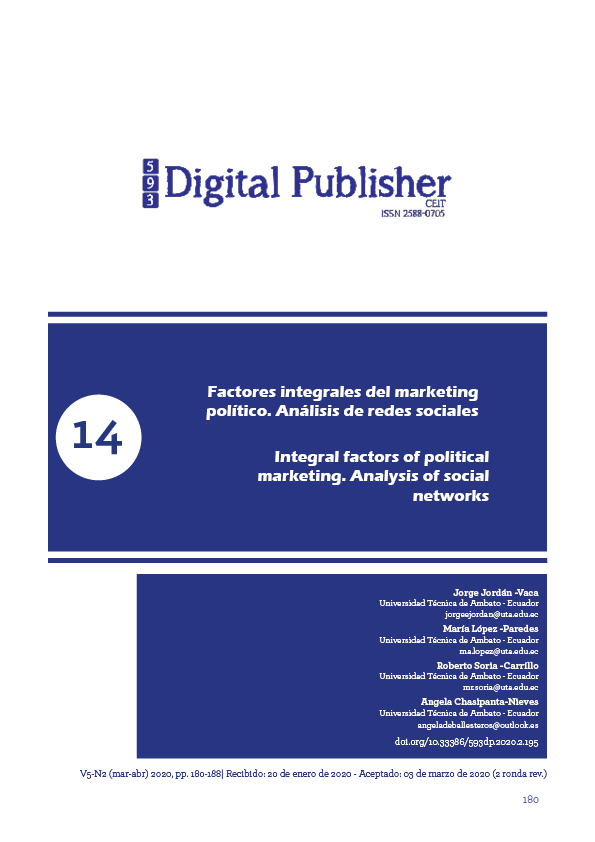Integral factors of political marketing. Analysis of social networks
Main Article Content
Abstract
The present investigation was based on the absence of social media marketing strategies by political parties, which has led to the loss of adherents and decreased popularity in future elections. The purpose of the study was to determine the integral factors of the marketing of political parties. The methodological-logical design of it was characterized by being of a mixed approach, since it went through different types of analysis. The investigative scope was descriptive, therefore, influencing factors that favor political actors are described. The study sample was 384 users of social networks older than 18 years with the right to pay. The main result revealed that the audience takes into account the factors of execution plans and type of campaign, from the perspective of creating sources of work and care of the environment. It is concluded that, the social network Instagram has the ability to capture greater adherents, because it allows to connect political figures directly and interactively with a target audience.
Downloads
Article Details
1. Derechos de autor
Las obras que se publican en 593 Digital Publisher CEIT están sujetas a los siguientes términos:
1.1. 593 Digital Publisher CEIT, conserva los derechos patrimoniales (copyright) de las obras publicadas, favorece y permite la reutilización de las mismas bajo la licencia Licencia Creative Commons 4.0 de Reconocimiento-NoComercial-CompartirIgual 4.0, por lo cual se pueden copiar, usar, difundir, transmitir y exponer públicamente, siempre que:
1.1.a. Se cite la autoría y fuente original de su publicación (revista, editorial, URL).
1.1.b. No se usen para fines comerciales u onerosos.
1.1.c. Se mencione la existencia y especificaciones de esta licencia de uso.
References
Aceves, F. (2015). Marketing político y rentabilidad electoral: el caso del Distrito 10 de Jalisco en las elecciones federales de 2003. Comunicación y Sociedad, Julio-Dici(4), 39–66.
Barragán, J., Guerra, P., & Villalpando, P. (2015). Mercadotecnia Política en México: Antecedentes y Estrategias Representativas The Political. Daena: International Journal of Good Conscience, 10(1), 192–204.
Barrientos, P. (2010). El marketing del partido político en el gobierno. Semestre Económico, 13(26), 119–134.
Bunge, M., & Sacristán, M. (1983). La investigación científica. Su estrategia y su filosofía. (G. E. Planeta, Ed.) (Segunda Ed). Mexico: Editorial ARIEL.
Castro, L. (2012). El marketing político en Estados Unidos : el caso Obama. Norteamérica, 7(1), 209–222.
Díaz, O. (2014). Marketing político y profesionalización de las campañas electorales presidenciales del Partido Acción Nacional y del Partido de la Revolución Democrática, 1994-2006. POLIS 2015, 11(1), 119–168.
España, D., & Rivera, E. (2012). Los universitarios y la democracia en Bogotá : un caso de marketing político. Papel Político, 17(1), 15–55.
Hernández-Sampieri, R., Fernández-Collado, C., & Lucio, P. B. (2014). Metodología de la Investigación. (M. Toledo, Ed.), Animal Genetics (Sexta). México D.f.: McGraw Hill.
Juárez, J. (2013). Hacia un estudio del marketing político : limitaciones teóricas y metodológicas. Espiral, 9(27), 61–94.
Martins, P. (2017). Bolsa Família : projeto social ou marketing político? Rev. Katál. Florianópolis, 10(1), 115–122.
Mejía, C., González, L., Montenegro, A., & Ordoñez, J. (2020). Gestión del marketing político en la imagen pública de los partidos políticos a través de las redes web. Cienciamatría, 6(10), 29–47. https://doi.org/10.35381/cm.v6i10.115
Murillo, K. (2013). Marketing y comunicación politica. El Cotidiano, Mayo-Junio(155), 31–41. Retrieved from http://www.redalyc.org/articulo.oa?id=32512745005
Salas, E., & Jaramillo, A. (2018). Estudio de los factores de éxito de la campaña de marketign político de Donald Trump. Revista Observatorio de La Economía Latinoamericana, Marzo, 1–28.
Sampedro, V., & Seoane, F. (2015). Las elecciones generales españolas de 2008: “Bipolarización antagónica” fomentada por intereses político-mediáticos y las nuevas tecnologías. Revista Sociología Política, 17(34), 129–135.
Sorj, B. (2016). Internet , espaço público e marketing político. Novos Estudos, 76, 123–136.
Triola, M. (2009). Estadística. (R. Fuerte, F. Hernández, & J. García, Eds.) (Décima). Atlacomulco, México: Cámara Nacional de la Industria Editorial Mexicana

